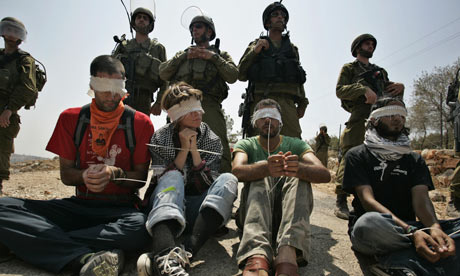EU rebukes Israel over conviction of West Bank separation barrier protester
 Thursday, August 26, 2010 at 10:57PM
Thursday, August 26, 2010 at 10:57PM Lady Ashton's support for Palestinian Abdallah Abu Rahmah deemed highly improper by Israeli foreign ministry
http://www.guardian.co.uk/world/2010/aug/25/eu-rebuke-israel-separation-barrier-protester
Harriet Sherwood in Jerusalem
Wednesday 25 August 2010 15.59 BST
 Dressed as detainees, Protesters against the West Bank separation barrier sit in front of Israeli troops in the village of Bil'in.
Dressed as detainees, Protesters against the West Bank separation barrier sit in front of Israeli troops in the village of Bil'in.
Photograph: Majdi Mohammed/AP
Lady Ashton, the EU's foreign affairs chief, today took the unusual step of publicly criticising the conviction in an Israeli military court of a Palestinian man in connection with protests against the West Bank separation barrier.
Ashton said she was "deeply concerned" the man may be imprisoned as a deterrent to others. The intervention, a week before the start of the first direct talks between Israel and the Palestinians for more than 18 months, is likely to irritate Israeli politicians. A government spokesman described it as "highly improper".
According to an EU source, Ashton's statement was intended to show the EU's support for peaceful opposition to the barrier and to demonstrate to the Israelis that the EU was monitoring events on the ground in the context of next week's negotiations.
After an eight-month military trial, Abdullah Abu Rahmah, 39, a protest leader in the West Bank village of Bil'in, was convicted yesterday of incitement and organising illegal demonstrations. He was cleared of stone throwing and possession of arms. Abu Rahmah, who has been in custody since his arrest last December, faces a maximum jail term of 10 years when he is sentenced next month.
Bil'in has been at the forefront of largely peaceful protests by Palestinian villagers and Israeli and international activists against the route of the separation barrier in the West Bank.
However, the protests have often included stone-throwing by youths, which the military counter with teargas and rubber bullets . In April 2009 a protester was killed when he was hit by a teargas canister.
Today's statement by Ashton, the EU high representative, said: "The EU considers Abdallah Abu Rahmah to be a human rights defender committed to non-violent protest against the route of the Israeli separation barrier ... The EU considers the route of the barrier where it is built on Palestinian land to be illegal.
"The high representative is deeply concerned that the possible imprisonment of Mr Abu Rahmah is intended to prevent him and other Palestinians from exercising their legitimate right to protest against the existence of the separation barriers in a non-violent manner."
The EU attended all court hearings into the case over the past eight months.
Yigal Palmor, a spokesman for the Israeli foreign ministry, said: "It is very unusual for a foreign dignitary to express views on the justice system of another country. If [Ashton] has found a flaw in the system, she should say so. Otherwise it's unclear why she should interfere in the proceedings. The fact that she has expressed a view and has disregarded the evidence is highly improper."
Abu Rahmah's lawyer - "and presumably that lawyer is not Lady Ashton" - was the correct person to the promote the best interests of the accused, Palmor added.
Gaby Lasky, Abu Rahmah's lawyer, welcomed Ashton's statement. "Soldiers have killed and injured dozens and hundreds of protesters in the attempt to stop the Palestinian popular struggle, but have failed," she said. "They are now trying to illegitimately use the courts and the legal system in the same way. The international community must take a tough stand on this issue, and I am happy that the political motivation of the indictment against a human rights defender was clear to the EU from attending the hearings."
According to the Popular Struggle Co-ordination Committee, the case was the first to use Israeli military law on organising illegal demonstrations since the first intifada, or uprising, which began in 1987.
Abu Rahmah's conviction, the committee said, was "based only on testimonies of minors who were arrested in the middle of the night and denied their right to legal counsel". The prosecution had failed to provide documentary evidence against Abu Rahmah despite the filming of all protests by the army.
According to his supporters, Abu Rahmah was arrested at 2am after soldiers broke down the door of his house.
 APJP |
APJP |  Post a Comment |
Post a Comment |